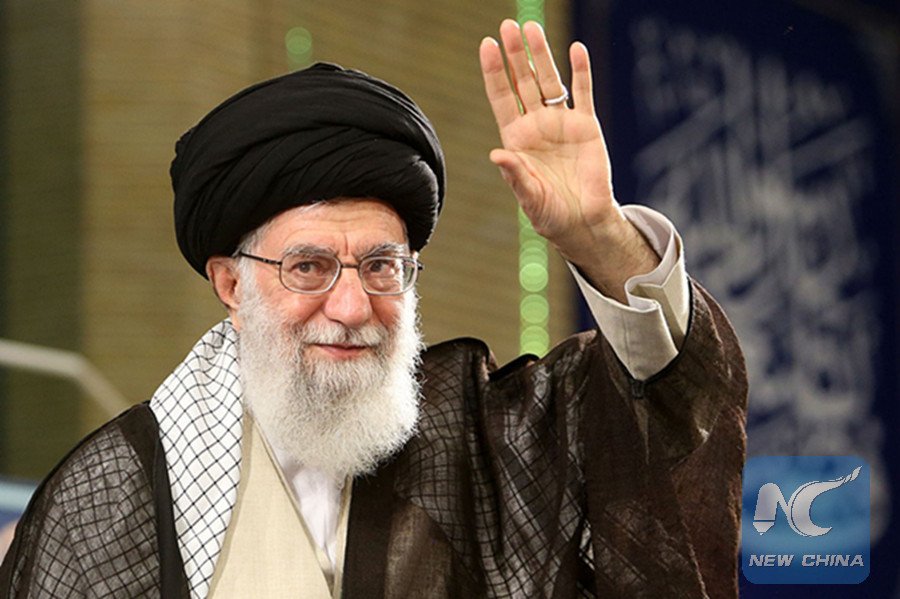 A handout picture provided by the office of Iran's Supreme Leader on April 30, 2018, shows Ayatollah Ali Khamenei waving to the crowd as he delivers a speech during Labor Day at the workers' meeting. (AFP PHOTO)
A handout picture provided by the office of Iran's Supreme Leader on April 30, 2018, shows Ayatollah Ali Khamenei waving to the crowd as he delivers a speech during Labor Day at the workers' meeting. (AFP PHOTO)
by Hassan Rouhvand
TEHRAN, June 6 (Xinhua) -- Amidst controversies over the 2015 Iranian nuclear deal, Iran's recent decision to prepare ground for boosting uranium enrichment capacity is likely to push Europe to the U.S. side.
On May 8, U.S. President Donald Trump decided to withdraw from the Iranian nuclear deal, also known as the Joint Comprehensive Plan of Action (JCPOA), claiming it did not address Iran's ballistic missile program, its nuclear activities beyond 2025, or its alleged role in regional conflicts.
Trump has called on the European countries to follow his step to quit the the international deal, in order to pressure Iran to renegotiate the deal to address what he called their "common concerns."
Currently, Iran is negotiating with the European countries on preserving the JCPOA, after the U.S. withdrawal, aiming to salvage its interests.
Despite the U.S. pressure, Britain, France and Germany, which are among the six signatories of the Iranian nuclear deal, have so far reiterated their commitment to the deal.
However, Iran's supreme leader Ayatollah Ali Khamenei on Monday said that it seems "some European governments expect the Iranian nation to both put up with sanctions and give up its nuclear activities."
The Iranian leader said Iran would not tolerate sanctions nor undergo "nuclear austerity."
He ordered the head of Atomic Energy Organization of Iran (AEOI) to immediately prepare the ground for the uranium enrichment "up to a level of 190,000 SWU (separative work units) for the time being within the framework of the nuclear deal."
SWU is the standard measure of the effort required to separate isotopes of uranium during an enrichment process. One SWU is equivalent to one kilogram of separative work.
Based on the nuclear deal, Iran can enrich uranium up to the level of 3.5 percent, which represents low-enriched uranium.
Following Khameni's decree, Ali Akbar Salehi, head of the AEOI, said Tuesday that the preparation work began at Iran's Natanz enrichment facility, observing the country's commitments to the nuclear deal.
"Yesterday, we took the first step and submitted a letter to the International Atomic Energy Agency (IAEA) on the start of certain activities. We started to take necessary practical measures today," Salehi told reporters on Tuesday.
Also, the spokesperson for the AEOI Behrouz Kamalvandi said Tuesday that the organization will inform the IAEA of the start of the process to increase the capacity to produce uranium hexafluoride (UF6), a chemical compound which serves as feedstock for centrifuges.
Kamalvandi said that under the 2015 nuclear deal, Iran was supposed to achieve an enrichment capacity of at least 190,000 SWU by the end of the 15th year since the nuclear deal took effect in January 2016.
In reaction, French President Emmanuel Macron on Tuesday warned of the risk of rising tensions due to the Iranian nuclear stand-off, urging "everyone to stabilize the situation and not give into this escalation which would lead to only one thing: conflict."
Meanwhile, French Foreign Minister Jean Yves Le Drian warned Iran on Wednesday that its plan to increase uranium enrichment capacity might have dangerous consequences.
"This initiative (of Iran) is unwelcome. It shows a sort of irritation. It is always dangerous to flirt with red lines," Le Drian said.
"If they go to a higher level then, yes, the agreement would be violated, but they need to realize that if they do then they will expose themselves to new sanctions and the Europeans will not remain passive," he warned.
In an interview with local broadcaster Europe 1, Le Drian called for a "global negotiation framework" on the Iranian issue, at the same time maintaining the 2015 nuclear deal, which he called "a step forward" in preventing Iran from having access to nuclear weapons.
"The Iranians must realize that if they break the agreement then they expose themselves to new sanctions. But, today the agreement is not broken and Iran fully respects its commitments," he said.
Iran has cast doubts about the "positive results" of the country's ongoing negotiations with the European parties, seeking to preserve Tehran's economic interests subject to nuclear deal.
"The prospect of the talks with the Europeans shows that the situation is not promising," Hossein Naqavi Hosseini, spokesperson of the Iranian Parliament's National Security and Foreign Policy Commission, said on Tuesday.
Iran should not waste time in waiting for required action from such governments, Hosseini said.
In response to Washington's decision, Tehran has threatened in the event that other parties to the nuclear deal could not safeguard Iran's interests under the accord, Iran will move out of it and resume its nuclear activities at full speed.
The 2015 deal has eased western and international sanctions on Iran in exchange for Tehran halting its nuclear program.

